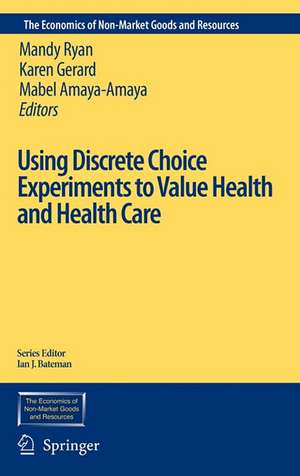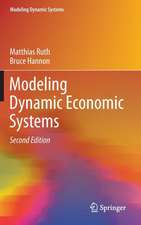Using Discrete Choice Experiments to Value Health and Health Care: The Economics of Non-Market Goods and Resources, cartea 11
Editat de Mandy Ryan, Karen Gerard, Mabel Amaya-Amayaen Limba Engleză Hardback – 5 noi 2007
| Toate formatele și edițiile | Preț | Express |
|---|---|---|
| Paperback (1) | 1379.21 lei 6-8 săpt. | |
| SPRINGER NETHERLANDS – 25 noi 2010 | 1379.21 lei 6-8 săpt. | |
| Hardback (1) | 1394.84 lei 6-8 săpt. | |
| SPRINGER NETHERLANDS – 5 noi 2007 | 1394.84 lei 6-8 săpt. |
Preț: 1394.84 lei
Preț vechi: 1701.02 lei
-18% Nou
Puncte Express: 2092
Preț estimativ în valută:
266.90€ • 278.66$ • 220.90£
266.90€ • 278.66$ • 220.90£
Carte tipărită la comandă
Livrare economică 04-18 aprilie
Preluare comenzi: 021 569.72.76
Specificații
ISBN-13: 9781402040825
ISBN-10: 1402040822
Pagini: 276
Ilustrații: XX, 256 p.
Dimensiuni: 155 x 235 x 17 mm
Greutate: 0.84 kg
Ediția:2008
Editura: SPRINGER NETHERLANDS
Colecția Springer
Seria The Economics of Non-Market Goods and Resources
Locul publicării:Dordrecht, Netherlands
ISBN-10: 1402040822
Pagini: 276
Ilustrații: XX, 256 p.
Dimensiuni: 155 x 235 x 17 mm
Greutate: 0.84 kg
Ediția:2008
Editura: SPRINGER NETHERLANDS
Colecția Springer
Seria The Economics of Non-Market Goods and Resources
Locul publicării:Dordrecht, Netherlands
Public țintă
Academic/professional/technical: Research and professionalCuprins
Dces: What are they and their Application in Health A User's Guide.- Discrete Choice Experiments in a Nutshell.- Designing Discrete Choice Experiments for Health Care.- Practical Issues in Conducting a Discrete Choice Experiment.- Case Studies in Valuing Health and Health Care.- Using Discrete Choice Experiments to Go Beyond Clinical Outcomes when Evaluating Clinical Practice.- Using Discrete Choice Modelling to Investigate Breast Screening Participation.- Preferences for Health Care Programmes: Results from a general population discrete choice survey.- Examining the Preferences of Health Care Providers: An application to hospital consultants.- Methodological Issues.- The Price Proxy in Discrete Choice Experiments: Issues of Relevance for Future Research.- “Irrational” Stated Preferences: A quantitative and qualitative investigation.- Using Stated Preference and Revealed Preference Data Fusion Modelling in Health Care.- Conclusions.- Concluding Thoughts.
Recenzii
From the reviews:
"‘Using discrete choice experiments to value health and health care’ is a highly valuable text devoted to discussion on utility of Discrete Choice Experiments (DCEs) as an economic assessment technique when measuring health-care benefits. … The book is aimed to new readers in Discrete Choice Experiments in health care as a review of several fields of research from the perspective of the human behaviour." (Ramón Álvarez-Esteban, International Review on Public and Nonprofit Marketing, Vol. 5, 2008)
"‘Using discrete choice experiments to value health and health care’ is a highly valuable text devoted to discussion on utility of Discrete Choice Experiments (DCEs) as an economic assessment technique when measuring health-care benefits. … The book is aimed to new readers in Discrete Choice Experiments in health care as a review of several fields of research from the perspective of the human behaviour." (Ramón Álvarez-Esteban, International Review on Public and Nonprofit Marketing, Vol. 5, 2008)
Textul de pe ultima copertă
Using Discrete Choice Experiments to Value Health and Health Care takes a fresh and contemporay look at the growing interest in the development and application of discrete choice experiments (DCEs) within the field of health economics. The authors have written it with the purpose of giving the reader a better understanding of issues raised in the design and application of DCEs in health economics. The use of this relatively new instrument to value health and health care has now evolved to the point where a general text is necessary. The few existing books in this area are either research monographs or focus almost entirely on more advanced topics. By contrast, this book serves as a general reference for those applying the technique to health care for the first time as well as more experienced practitioners. Thus the book is relevant to post-graduate students and applied researchers with an interest in the use of DCEs for valuing health and health care and has international appeal.
The book comprises Chapters by highly regarded academics with experience of applying DCEs in the area of health. The first part of the book summarises how DCEs can be implemented, from experimental design to data analysis and the interpretation of results. In many ways this can be regarded as a crash course on the conduct of DCEs. Extensive reference is made throughout to other sources of literature where the interested reader can find further details. The book also includes a series of case studies illustrating the breadth of applications in health economics and some key methodological issues. Finally there is an overview of research issues discussed which the editors believe are at the leading edge of this field.
The book comprises Chapters by highly regarded academics with experience of applying DCEs in the area of health. The first part of the book summarises how DCEs can be implemented, from experimental design to data analysis and the interpretation of results. In many ways this can be regarded as a crash course on the conduct of DCEs. Extensive reference is made throughout to other sources of literature where the interested reader can find further details. The book also includes a series of case studies illustrating the breadth of applications in health economics and some key methodological issues. Finally there is an overview of research issues discussed which the editors believe are at the leading edge of this field.
Caracteristici
Rigorous overview of DCE methods and application in health economics Transparency in how to apply current thinking on experimental design to health economics applications Clear and illuminating series of applied case studies demonstrating different types of choice modelling techniques and the use of results for policy analysis Clear and illuminating series of methodological case studies by internationally respected leaders in their field































